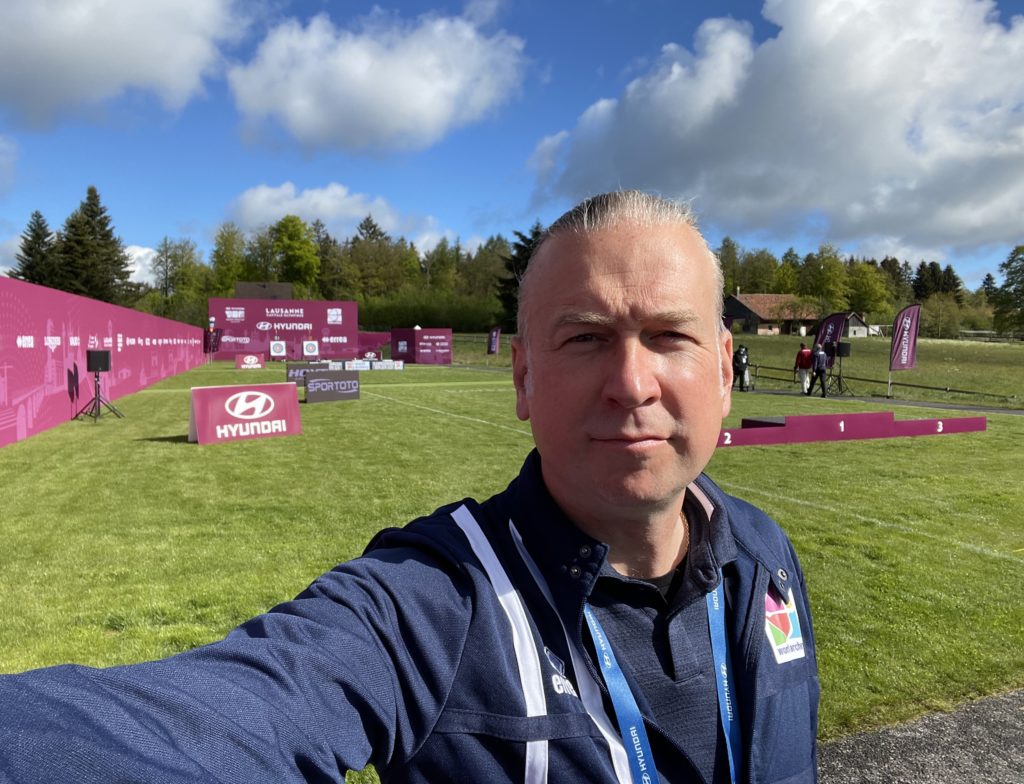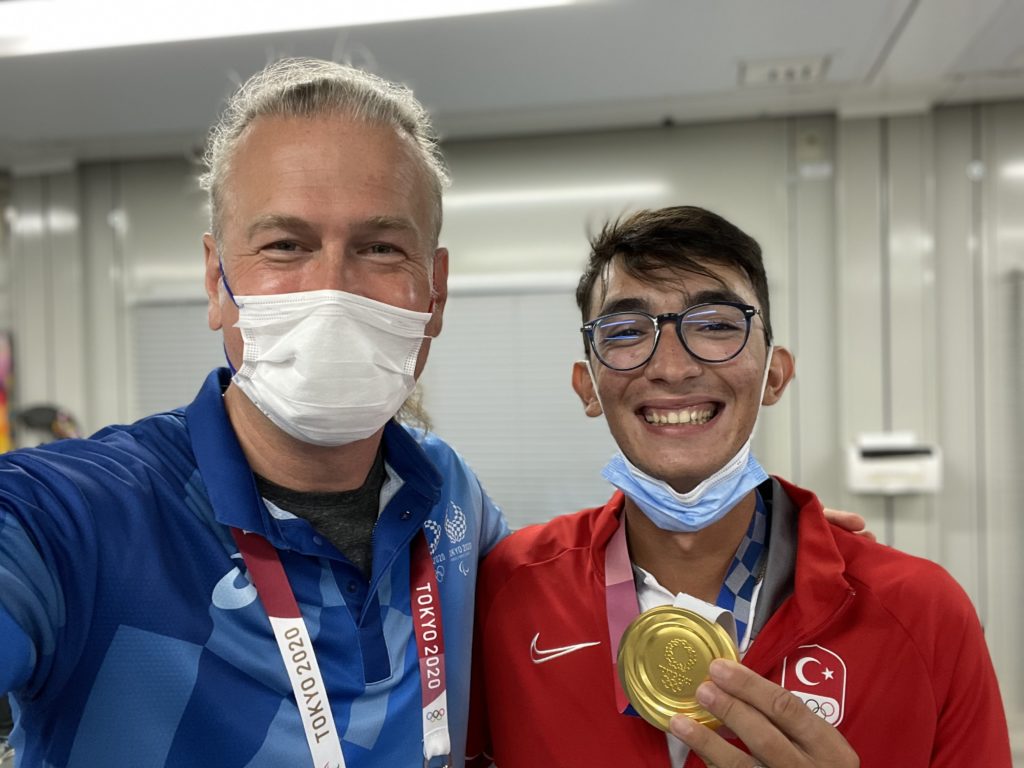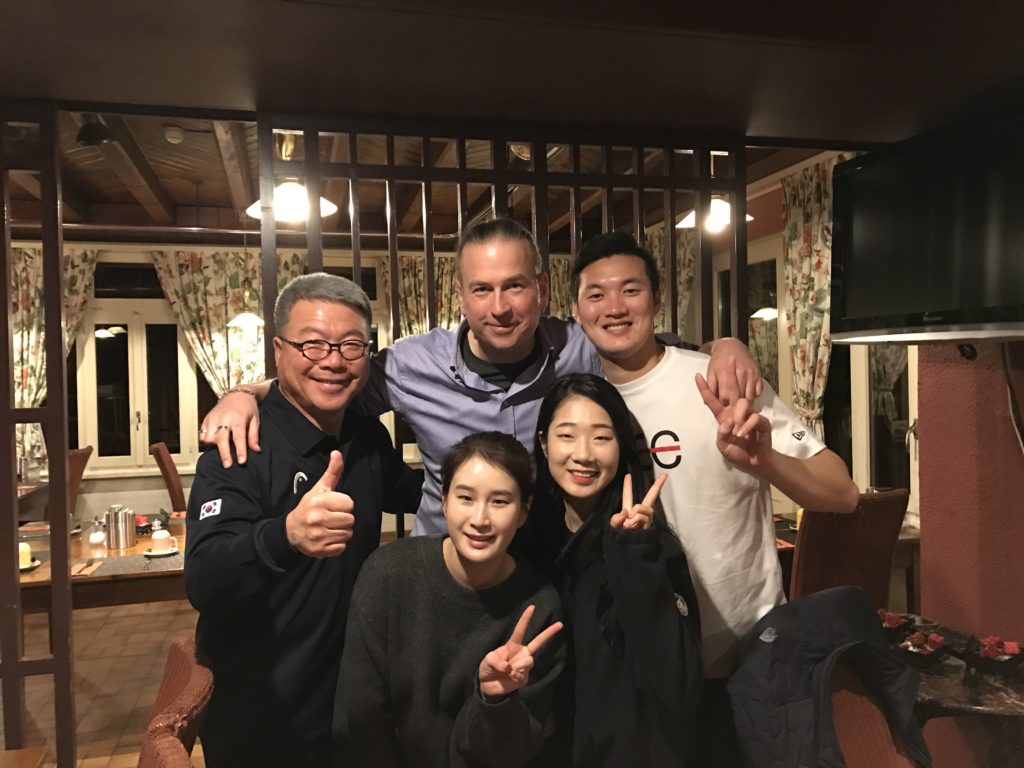The voice of World Archery events speaks to Bow International.

Anyone watching the Tokyo Olympic Games will have heard a highly distinctive ‘10!’ in the background, every one of them called in the arena by Marc Chavet, a genial French-American who began working with World Archery back in 2013. With a spotting scope in one hand and a microphone in the other, Marc’s job is to bring excitement and character to every sporting moment on the field.
Like a few other regular event staff, he came to archery via other sports – and originally, in French rather than English. After settling for good in Paris in the mid-noughties, Chavet started working for Eurosport in French; prior to that he’d only previously worked in English as a commentator, broadcaster and announcer.
“My adventure with World Archery started in 2013, when there was the World Cup final in Paris. At the time, I was the go-to commentator for archery on Eurosport. I was in touch with the French federation who then said, ‘We’d be interested in putting your name forward for the final. Would you be interested in doing it?’ I said, ‘Yeah, sure.’ And it kind of started like that.
“It was supposed to be a one-off for that event, in French, in Paris alongside Crispin Duenas. He would do everything in English, then I would do everything in French behind it. The following year was the Lausanne World Cup Final, where I did the same thing, then I started working in English as well for World Archery, starting the 2015 season in the lead up to Rio 2016, because they were looking for a new voice for the Olympics.”
Chavet’s main gig every year is cycling and for the past eight years he has been the on-site bilingual MC announcer for the Tour de France at the start and finish of each stage. “I have actually done 11 Tours all together because I covered it for radio a long, long time ago, and I did two for television as well in the studio. I don’t only do Le Tour, I have about 65 days per year of cycling events, and I do about 140 days a year of TV commentary too on a variety of different sports.”
Getting ready
Many in the archery community have commented on the incredibly thorough preparation Marc does for the announcer role. “One of the things that I bring to the table is that I’m a journalist by training,” he says. “I’ve been a journalist for 20 years. So I have a different way of looking at an event when I prep it. I don’t do it necessarily as an MC would.
“I need to be thorough, because when I get to an event I need to know that I did all my groundwork before so I’m free like a bird to do what I want on the mic. I only get to that state of mind if I know I’ve put the hours in before. It sounds a bit over the top but it’s actually true.”
“I have my own personal notes for every event I’ve covered since 2012, basically. I have a top eight for every event. I have stats per archer. I try to get general interest things in there as well. I’ll get hobbies, background and what they like doing when they’re not shooting, things of that nature that can fill in at some point, which may or may not be useful.
“I talk to the media team quite often as they’re in tune with whatever is going on at the moment. Some of the years I only do one event. In cycling I do almost all the events, so you have reference points all throughout the season – which is useful when you’re on the Tour. I know what happened to such-and-such rider the last time out, because I was there, and I called it,” he points out.
Bringing Emotion
“Exactly the same applies to archery. I was there in Rio when Salsabilla beat Kim Woojin. I remember that arrow, and I remember the feeling, the emotion, you know, because I was there, I was calling it. That’s the advantage also of being on site and being at events because you tend to remember specific moments like that. Obviously not every arrow of every match, but the key things that happened and the emotions around them.”

After weather delays in Tokyo, the Wednesday of eliminations was excruciatingly long for all the staff, who still had to deliver the full Games experience for everyone.
“Forty-two matches.” grins Marc. How do you keep the energy up for that? “It’s about preserving the voice. You can’t go as enthusiastic, you can’t go as high energy or you are just not going to last the day. But whether it’s 9.30 in the morning or 8pm on the same day, you need to hit that that “10-10-10!” with authority and that’s what I do.”
“It’s a lot of fun to be at the Olympics and to call every single arrow that’s shot on the field of play. The next one is in Paris, of course – where I live. If I’m the only announcer I can do the English and the French. We’re talking about that at the moment. I’m not sure it’s been been done before in the Olympics. One event, one announcer, two languages. It would be a lot of work, but double the fun!”
Essentially, the job is not only about informing the audience, it’s about adding another level of excitement and emotion to the sporting experience, by using the voice.
“I had a guy at the World Cup final in Moscow come up to me and say, ‘I like the way you characterise; when you say 10-10-10 it feels like you’re talking about someone. I try to stamp them out and bring the vocal elements to life. It does make a difference, particularly for the people who pick it up. And all that is just done with inflections on the voice and tones and things like that. It’s fantastic, and a lot of fun.”


